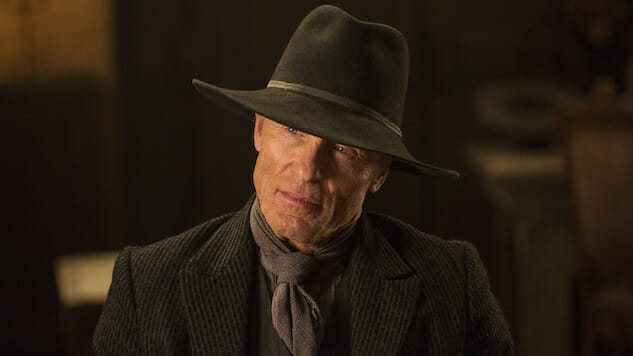Introducing Endless Mode: A New Games & Anime Site from Paste
The most wonderful and frustrating part of Westworld is that we don’t get any glimpse of life outside of the park. We don’t know anything about the world at large beyond the small morsels thrown into the script.
In this week’s episode, for example, we learn that an outside interest, represented by the noxious Logan (Ben Barnes), is looking to buy up Westworld because it’s “hemorrhaging money,” and that our hero, William (Jimmi Simpson), is a bit of a patsy within the company, moving up the corporate ladder while more egotistical men mock him behind his back.
The more telling detail, though, comes out of the conversation between the two gents who work on repairing the Hosts and putting them back into service. As Maeve (Thandie Newton) is delivered to them for another round of fixes, the younger one balks, leading his older partner to laugh and mention that “personality testing should have weeded you out as an embryo.”
This adds a further layer of depth to what’s going on within the corporation, and potentially the rest of the planet. It seems Westworld resides inside a huge organization that marks people for service within the theme park, either as a fixer or a developer or maybe even an executive. Like the caste system it is, you’re meant to stay in your lane and be content with the small pleasures they hand down to you. Which is why it’s viewed as potentially dangerous to have the young repairman trying to learn coding and move up in the world.
Despite even their biggest delusions of grandeur, everyone in this show leads a life of quiet desperation. It’s only the wealthy among them who can pay to indulge in whisky and murder and unprotected sex. They are the ones who truly get to experience being in complete control (or going completely out of control) and capable of God-like acts. This is what leads rich narcissists like Donald Trump’s sons to gun down defenseless wild animals in an African big game park. They can afford the privilege of being made to feel even more powerful than they likely already do.
It’s Ed Harris’s character that gets thrown into starkest relief in light of all this. Here is someone that, in the real world, has helped save many lives through his foundation, which was hinted at last week. Even those good deeds are not enough. He keeps returning to the park to flip an internal switch and turn into a complete savage. Over the course of five episodes, we’ve watched him gun down dozens of Hosts, mine another for its blood, scalp another, and assault poor Dolores (Evan Rachel Wood). And he’s hinted at equally horrible things that he’s acted out on previous visits to the park. As Logan says at another point in the episode, this place exists to reveal who a person truly is deep down. The trick is figuring out whether to accept it or fight against it.
Like the Hosts that are slowly waking up to the truth about their existences, Westworld is equally self-aware. Whether they meant to or not, the writers are providing a pretty damning commentary on the state of modern life, right down to the simple choice of watching a TV show. The reason many of us turn on HBO every Sunday night, or one of the thousands of other entertainment options available to us, is partly as an escape from our own quietly desperate lives. We want to cheer for the hero and jeer the villain, or vice versa. Or we want to just enjoy the base pleasures of watching sex and violence splayed out in all its glory before getting to bed and getting back to work. And I’m sure many viewers long to be wealthy enough to indulge in something similar to Westworld or at least seek out the version of it that aligns with their socioeconomic status.
Westworld provides us with that diversion. How we respond to it—whether we’re completely seduced by its raw pleasures and charms, à la Logan, or, like William, we maintain our skepticism and ability to self-reflect even as we enjoy the ride—is the real measure of who we are as humans.
Robert Ham is an arts and culture journalist based in Portland, OR. Read more of his work here and follow him on Twitter.
